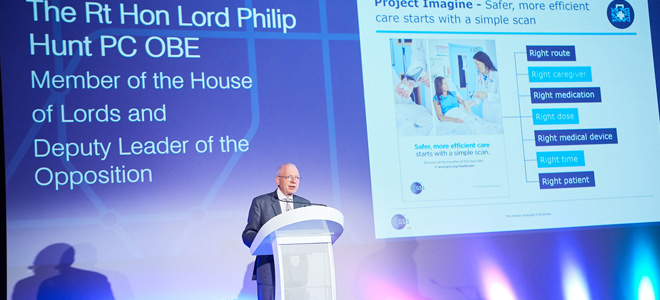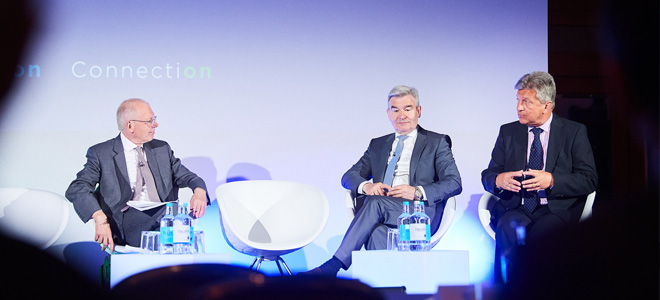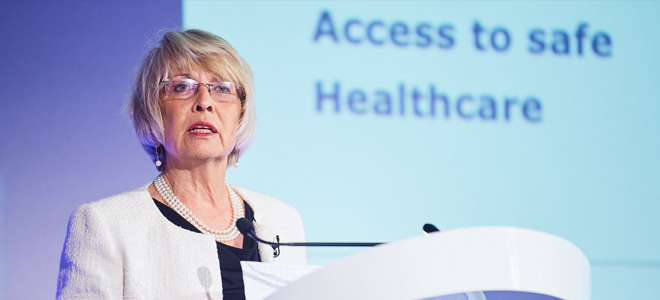May 31, 2017
Senior leaders discuss how GS1 standards are supporting the future of healthcare

The healthcare plenary of the GS1 UK Industry Conference opened with Lord Hunt outlining the impact of GS1 standards are having in the NHS and the case for their use globally. Like many healthcare providers throughout the world, the NHS faces considerable pressures - a growing population, an increasing number of patients and a budget that can’t keep up. What GS1 standards offer is a “no-brainer”, not just improving efficiencies in the supply chain but also having a positive impact on clinical outcomes and understanding. And a perfect example of this was to follow in the presentation given by Kevin Downs, Director of Finance and Performance, and Keith Jones, Clinical Director of Surgery, both from Derby Teaching Hospitals NHS Foundation Trust.
Kevin’s challenge is that his Trust’s 35 theatres are full, and their only option is to get those theatres running more efficiently. That’s what drove them to adopt GS1 standards three years ago and they now use them to track products to patients across all their theatres, including endoscopy and cardio cath labs. Kevin’s view on the data this gives them is that “we need to get this discussion in the NHS out of the supply chain. This system provides the basic management information that the NHS needs to run its business.” They’re saving over £1m a year already and now have over 97,000 theatre episodes recorded – that’s a major database of clinical information.

That information is key for Keith Jones, it’s vital for patient safety and it’s vital for managing the performance of the 68 consultant surgeons in the Trust. In the case of a product recall, for example, he now knows at the push of a button who has been affected. Before, this would’ve taken 50 hours to trace, now it takes 30 minutes. And, this data also means Keith can look at procedures in surgery – comparing time taken, number of staff used and costs incurred to make sure they’re working as efficiently and safely as they can.

Efficiency and safety is at the heart of the NHS and it’s at the heart of the 100,000 Genomes Project, presented by Professor Sue Hill, Chief Scientific Officer at NHS England. Genomic medicine is fundamentally changing the way the NHS cares for patients, offering a personalised approach to medicine rather than a one-size-fits-all approach. It involves looking at all the individual letters in a person’s genetic code, to get an understanding of the underlying cause of their condition and prescribe accordingly – enabling earlier treatment of patients, in a way that’s tailored to them. And GS1 standards have a vital role to play here too, they’ve been specifically mandated for sample tracking within the project because they offer a clear and effective way of tracking data on a national basis. They offer a safe pair of hands for data that is sensitive and that needs to be right, so that a patient can receive the right treatment. Genomic medicine is the future of care and GS1 standards are supporting that vision.

Bringing us back to the present was the job of Ulrike Kresya, Vice-President, Healthcare at GS1 Global Office. Access to clean water, safe healthcare and vaccinations is something most of us take for granted, but GS1’s work in the humanitarian sector shows that these guarantees are not in place everywhere. GS1 standards are making a difference by fixing the broken supply chains often found in developing countries. Pilots are taking place across the world to use standards to help these countries get access to the kind of healthcare everyone deserves. A pilot in Tanzania, for example, using barcodes for vaccinations, is now being rolled out across the country, with investment from the Bill Gates Foundation to help provide the scanners.
We’ve seen the successes of GS1 standards in the NHS, their use in the future of genomic medicine, but the biggest success of all would be to see this provision of healthcare – getting critical goods to those in need – globally.
Related
Relive the conference – watch the videos and download the presentations
GS1 standards are helping the NHS save thousands of lives and millions of pounds